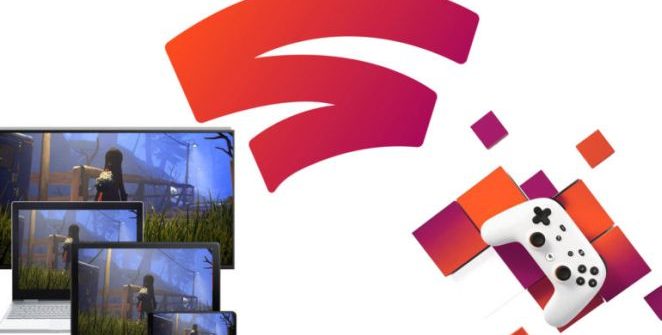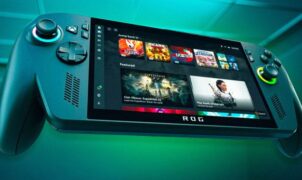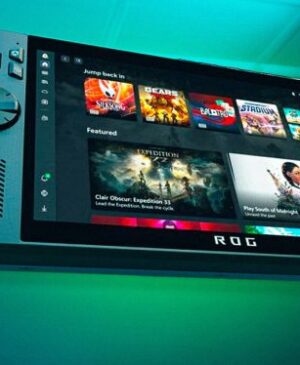One of the significant events of this year’s Game Developers Conference was the Google keynote… but is there a chance of success in something we have already seen ten years ago?
Google Stadia is going to be a cloud-based game streaming service, which will not require a separate console/box – on PC/mobile/tablet, you’ll only need a Google Chrome browser, on TV, you’ll have to have Chromecast, or you must have a Google Pixel device to access Stadia, and – obviously – you’ll need a decent Internet connection as well (which wasn’t even mentioned at all during the keynote!!!). The website says that we could even play in 4K / 60 FPS, and later, 8K / 120 FPS will also be possible. No downloading will be required. You can start the game immediately. There will be cross-play support, too.
The developer website revealed the hardware side of the Stadia – a custom 2.7 GHz hyperthreaded x86 CPU with AVX2 SIMD and 9.5 MB L2+L3 cache; a custom AMD GPU with HBM2 memory and 56 compute units capable of 10.7 teraflops (the Xbox One X is capable of 6 TFLOPS, the PlayStation 4 Pro has 4.2… also, it sounds like the AMD RX Vega 56…); 16 GB of RAM with up to 484 GB/s of performance; SSD cloud storage. The Stadia supports Vulkan, as well as the Unity and the Unreal Engine. It also uses the Debian Linux. There are other developer tools, too (Havok, RenderDoc, Visual Studio, LLVM, AMD RadeonTM2 GPU Profiler, IncrediBuild, UmbraTM 3, FaceFX, Intelligent Music Systems…).
A lot of keyboards/mice/USB controllers will be supported by default, but, as we have seen previously, there will be a (wifi) Stadia controller, with which we can quickly share our recording, start a multiplayer match, or ask for help with the Google Assistant button. There will also be a Share button, allowing easy sharing to YouTube, even in 4K / 60 FPS. The State Share is also an interesting idea – you can basically savestate in the game, allowing others to continue where you have stopped. The Style Transfer ML (ML = machine learning) will create custom, unique visuals for a game based on machine / deep learning. The demo showed a game getting „a coat of Pac-Man paint.”
The Stadia is already backed by several companies/developers/publishers. They are 2K Games (NBA 2K was used to highlight Stadia’s Crowd Play feature), id Software (Doom Eternal, the first announced game for the platform, was demo-ed on it with 4K / 60 FPS), Q-Games (showing an unannounced game, demoing the State Share feature), Square Enix (Rise of the Tomb Raider was used to present the Google Assistant integration), TequilaWorks (the Style Transfer feature was demo-ed with their game), and Ubisoft (Assassin’s Creed: Odyssey ran on the Stadia).
Google already has a development studio called Stadia Games and Entertainment, making exclusive titles for the Stadia. It will also collaborate with external/third-party developers to help them join the platform. It’s headed by former Assassin’s Creed and Star Wars Battlefront II (Ubisoft and Electronic Arts/EA Motive, respectively) producer, Jade Raymond. Let’s take a look at the videos, we’ll continue after these – introduction, an official reveal, a recap, and the entire one-hour keynote.
Jade Raymond has revealed that the Google Stadia developer kits (which can be partially cloud-based) were sent out to over a hundred developers, and after the Game Developers Conference, this number could significantly increase. Especially how the Unreal Engine 4 is already (!) supported on the Stadia: „We’ve been building our support for Stadia to ensure that developers using Unreal Engine can hit the ground running and be successful on the platform. Today we’re releasing a fully-featured integration with Stadia to help developers bring their games to an even broader spectrum of players,” Epic’s senior platform engineer, Arciel Rekman said.
The Redditors have discovered an easter egg on the Stadia website, which gives you a rotatable view of the Stadia controller. All you need to use is the Konami code: up, up, down, down, left, right, left, right, B, A. Unfortunately, the Stadia.dev site doesn’t have a similar secret…
A few characters above, Ubisoft was already mentioned. We’d take a turn towards to them – Yves Guillemot, the CEO of Ubisoft, was one of the attendees of the keynote, and he told GameSpot that in his opinion, the Google Stadia will be „complementary” to consoles and PCs: „You have to look at Stadia as complementary. If you get internet you play on the machine that gives you a chance to experience your game. What’s good in this industry, either you play on the mobile or you play on PC, and now it’s starting to be the same game. I think this is a way to play differently depending on where you are as well. I think 5G has to come fast, but what we see is there will be lots of possibilities to use it, so if cities are really putting 5G, the oldest cities will have to react quite fast if they want to keep all the people they have in cities. So this, I think, is going to push 5G a lot.” We don’t necessarily agree with his last sentences. Also, we doubt if they will be capable of scaling down their future games to suit our Internet connection speeds and quality…
We intentionally left the worst for last. DigitalFoundry has released an analysis of the Google Stadia. They tried Assassin’s Creed: Odyssey on 1080p/30 FPS with a 200 megabit Internet connection via wifi. The result was a 166-millisecond lag (the time needed from the button press to the reaction in the game), which means 10 frames of lag per second, or missing every third frame in a second. Allow us to repeat it: with a 200 Mbit connection, on 1080p/30 FPS. We don’t even dare to think about 4K / 60 FPS. The „worst case scenario” test isn’t much better either: with a 15 megabit connection, the lag was 188 ms. In comparison: Xbox One X – 145 ms, PC (30 FPS) – 112 ms, PC – 79 ms, and the Project Stream test was 179 ms. There’s a difference. With fighting, racing, and shooter games, this lag will be a hindrance. The analysis also pointed out the artefacts on the screen…
Google Stadia will launch this year in Canada, the United States, the United Kingdom, and „most of Europe.” Google did not say a word about pricing or the Internet connection requirements. It’s possible that it will have advertisements. (And a bit of personal opinion – it fits into the format: one of the comments have made us laugh, but it might be the future – „Imagine playing Dark Souls 4 and getting an ad during a boss fight.” – the editor)
And the „ten years ago” thought was mentioned for a reason at the start – the OnLive was a similar system: games streamed via the Internet. However, one: the United States’ Internet quality isn’t the best (average speeds, accessibility) – how will Google utilise it outside metropolises and major cities? Two: the Ouya, an Android console, tried something similar, and that also flopped a few years ago – what is the hook behind the Google Stadia? We don’t know it yet.
„The future of gaming is not a box.” Are you sure about that?
Source: Gematsu, WCCFTech, WCCFTech, PCGamer, DualShockers, GameSpot
















Leave a Reply